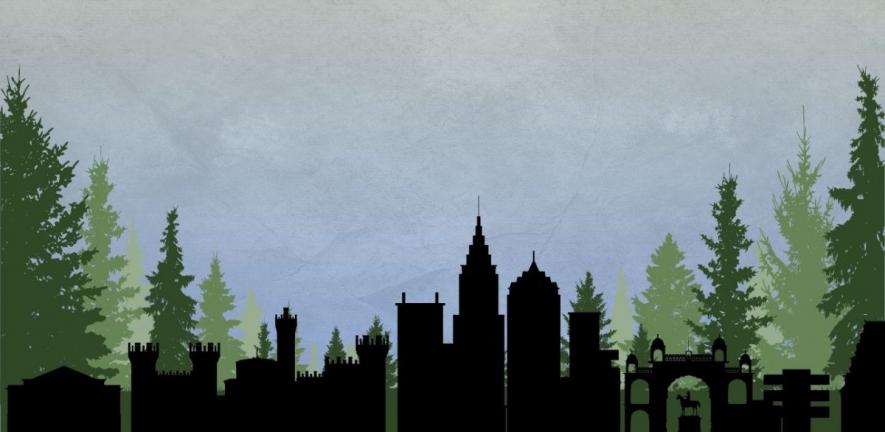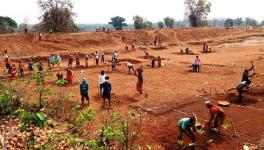Will Congress Work To Deepen Democratic Forest Governance in Karnataka?

THE Scheduled Tribe and Other Traditional Forest Dwellers (Recognition of Forests Rights) Act, 2006 (FRA) is a landmark legislation, enacted to correct historical injustices meted upon Adivasi, forest dwelling and pastoral communities during the colonial period as well as in the post-independence era. According to the preamble to the Act, the injustices can be rectified by providing tenurial rights and livelihood security to Scheduled Tribe (ST) and Other Traditional Forest Dweller (OTFD) communities.
In the recent Karnataka assembly elections, the concerns of various forest dependent communities may have played an important role in determining the results, especially in the constituencies of southern Karnataka.
Community forest resources (CFR) potential and its implementation in Karnataka

Source: Potential for Recognition of Community Forest Resource Rights Under India’s Forest Rights Act: A Preliminary Assessment (2015).
The above table shows the CFR potential in the state till 2015.
The total population which might benefit from CFR rights in Karnataka stands at 1.05 crore (as per Census 2011), and over 26 lakh hectares of forest land can be claimed for CFR titles.
The FRA is significant not only from the point of view of livelihood and tenurial security, but also for opening a valuable avenue to reinvigorate community-based conservation.
The FRA is significant not only from the point of view of livelihood and tenurial security, but also for opening a valuable avenue to reinvigorate community-based conservation. The provision of community forest resource rights or CFR rights under Sections 3(1)(i) and 5 signals a significant devolution of power to the gram sabha for managing, conserving and protecting the landscape. It also signals socio-economic autonomy, and challenges the colonial framework of forest and natural resource governance.
Also read: Forest Rights Act: While non-BJP states perform better, the law is moving at a snail’s pace in J&K
Districts with the most potential for the issue of forest rights recognition, and presence of potential right holders and voters from STs and OTFDs
- Most of the districts with maximum potential are limited to the southern part of Karnataka along with one coastal district
- Chamarajanagar, Kodagu and Mysuru districts are host to three major national parks and protected areas which include Nagarhole, Bandipur and B.R. Hills. The assembly seats located in these districts have given clear mandate to the Indian National Congress (INC).
- Within the protected areas, there has been a persistent demand by various Particularly Vulnerable Tribal Groups (PVTGs) and other communities from the STs for recognising CFR and implementing the FRA.
- The sanctuaries situated in the districts of Mysuru, Kodagu and Chamarajanagar have witnessed long-standing pending claims along with potential.
Trends in reserved constituencies
According to political analysts, the INC successfully convinced voters from the economically depressed communities to vote for it. In fact, the INC won 14 of the 15 seats in reserved ST seats, with the remaining one seat won by the Janata Dal (Secular). The INC’s performance in the Scheduled Caste reserved seats remained positive, with it winning 21 of the 36 SC reserved seats.
The performance can mark new beginnings for the party if it is able to deliver on the promises in its manifesto. However, the potential of the FRA, which was enacted in the INC-led United Progressive Alliance (UPA) era, still remains to be realised, especially in Karnataka.
In previous assembly elections in Chhattisgarh, Jharkhand, Madhya Pradesh and most recently in Himachal Pradesh, the INC benefitted from addressing issues related to the FRA as well.
Concerns around the Forest Rights Act in Karnataka
Monumental rate of rejections of claims
Karnataka has one of the highest rejection rates in the country in this regard. Till November 2022, 93.8 percent of the processed claims had been rejected. Out of the 291,736 total claims, 244,560 had been rejected, while 260,687 claims were reportedly disposed of. The majority of the rejections were in the districts of Mysuru, Chamarajanagar and Ramanagara. Until July 2022, as per the tribal department, over 16,000 applications were rejected under the FRA across the districts of Shivamogga and Sagar.
Yet another concerning aspect in the state has been the sanctioning of partial land rights and granting titles without compliance with the FRA.
Also read: Article 371: Citing encroachment on its special status, Mizoram revokes Forest Rights Act, 2006
Tracking the journey from 2018 to 2022
According to the Union Ministry of Tribal Affairs’ Monthly Progress Reports which this author analysed from 2018 to 2022, the implementation of the FRA, especially claims under community rights, show worrying trends.
A total of 10,387 new claims have been filed under the FRA in four years, including IFR and CFR. However, titles have only been distributed to 54 claims. On the other hand, the titles approved under community rights have significantly decreased. A sum of 63,604 claims have been rejected since the previous elections.
A total of 10,387 new claims have been filed under the FRA in four years, including IFR and CFR. However, titles have only been distributed to 54 claims. On the other hand, the titles approved under community rights have significantly decreased. A sum of 63,604 claims have been rejected since the previous elections. Until 2018, approximately 70 percent of the claims were disposed of with respect to the total received, and this figure had gone up to 90 percent by November 2022. The titles distributed over the total number of received claims also decreased from 5.71 percent to 5.53 percent over this period.
In March 2022, the Union Minister of State for Tribal Affairs informed the Parliament that among the pending claims, 95 percent applications belong to the OTFDs. Among the reasons enlisted for this were “lack of documentary evidence”, “multiple claims for the same land” and “claims filed for lands other than forest/revenue land”, while it was also admitted that new elections have not taken place after the office term of the district level committee and sub-divisional level committee members was completed.
The minister also clarified that 94.46 percent of the claims filed by STs were disposed of and only 5.54 percent of their applications were pending. This is rather alarming because more than 32,000 applications by ST communities have already been rejected.
Are the rights of forest-dependent communities threatened?
The Jenu Kuruba community, a PVTG, has been persistently resisting large-scale eviction, among other things. The PVTGs are entitled to habitat rights under the FRA. However, the community has raised concerns over evictions and the laggard implementation of the FRA, and expressed their opposition to the proposed Forest (Conservation) Act Amendment and the lack of basic development facilities like schools and healthcare.
They have also expressed that they fear the forest department more than wild animals, as the department often implicates the members of the communities under false cases. According to the forest department, nearly a third of the 2,785 Adivasi families in Nagarahole were relocated over the last two decades. As they were being displaced from Nagarahole, their applications to secure rights under the FRA were rejected by the Kodagu district administration. There are reports of custodial torture, and direct confrontation with forest department officials and guards, which has led to a sense of fear and insecurity over facing criminal cases among various forest dwellers.
In April 2022, the Karnataka forest department issued an order to stop evictions from the forest. However, on July 8, 2022, a new letter was issued by principal chief conservator to reverse the stay on eviction and withdraw the previous order.
Another concern remains due to pending compensation and rehabilitation claims of displaced communities. With the high rejection rate under the FRA and lack of proper rehabilitation measures, various communities have been urging the government to regularise their lands and provide relevant documents so that they can avail benefits.
Karnataka has emerged among the top tiger conservation states, with 524 tigers reported in its range. However, the cost of tiger conservation has been exclusively borne by and still continues to be borne by marginal farmers and forest-dependent communities.
The Union Minister of State for the Ministry of Environment, Forest and Climate Change (MoEF&CC) informed the Lok Sabha last year that between 2018 and 2021, 108 humans died by tiger attack. Tiger attacks have been reported to have increased significantly over the years. In certain villages and districts, elephant interactions with humans have become menacing— the farmers live in constant fear of having their produce be eaten and destroyed by elephants.
Meanwhile, the government resorts to short-term solutions and meagre compensation. The cultivators are at the receiving end from the legal point of view as well, as injuring or killing of animals leads to extended jail terms, loss of livelihood and exhausting their savings.
There are reports of custodial torture, and direct confrontation with forest department officials and guards, which has led to a sense of fear and insecurity over facing criminal cases among various forest dwellers.
Anxiety has loomed large since the Forest (Conservation) Amendment Bill, 2023 (FCA) effectively changed the definition of ‘forest’ given by the Supreme Court in T.N. Godavarman vs Union of India & Ors (1996). The FCA attempts to bring non-forestry activities under forestry, refrains from clarifying rules relating to the FRA, and has no reference to consent from the gram sabha either.
The FRA is undermined in the FCA, while at the same time protected areas and national parks are not exempted from forest clearances. Land use can be changed ambiguously as vague terms, like “public utility projects”, find mention in the Bill— to be specified by the Union government. The forest land identified by these ambiguous projects will be exempted from the purview of the FCA; therefore, the legal protection to forests as defined by the Supreme Court would no longer stand.
The large extent of land diversion, firstly to make way for “public utilities” and thereafter to provide land for compensatory afforestation without consent of the gram sabha, will lead to the violation of rights, increase in human–wildlife conflicts, and the severe loss of forests. Objections regarding this were raised by the chairperson of the National Commission for Scheduled Tribes, only to be ignored by the Union Minister of State for MoEF&CC.
Recommendations
- Immediate stoppage of forceful evictions of communities, and recognition of rights with proper implementation of the FRA at the earliest: Section 4(5)of the FRA bars eviction of forest dwelling STs or other OTFDs until the settlement of their forest rights has been carried out.
Also read: Forest Rights Act: Supreme Court extends its stay on eviction of tribals and other dwellers
- Recognition of community rights and habitat rights PVTGs and other Adivasis in national parks and protected areas: The FRA, under its Section 2(d), defines the term ‘forest land’ as land of any description falling within any forest area, and including unclassified forests, non-demarcated forests, existing or deemed forests, protected forests, reserved forests, sanctuaries and national parks. The FRA only recognises pre-existing rights which are already being exercised by eligible persons in national parks and sanctuaries.
The large extent of land diversion, firstly to make way for “public utilities” and thereafter to provide land for compensatory afforestation without consent of the gram sabha, will lead to the violation of rights, increase in human-wildlife conflicts, and the severe loss of forests.
Section 3(1) of the FRA mentions 13 types of community forest rights from forest land, including grazing, fodder, fuelwood, medicinal plants, and cultural and spiritual uses. Section 3(1)(i) provides CFR rights, under which the rights to protect, manage and conserve forest resources are recognised. The FRA also accords the right to collect and sell the products obtained from the forests to forest dependents.
- CFR and grazing rights to pastoral communities: There is a specific provision for protection of the rights of pastoralist communities under Section 3(1)(d), which describes the following forest right: “other community rights of uses or entitlements such as … grazing (both settled or transhumant) and traditional seasonal resource access of nomadic or pastoralist communities.”
- Review of the large number of rejected claims of the ST and OTFD communities.
- Strict legal action against forest officials for rights violations, atrocities committed against members of the PVTGs and Adivasi communities, by application of criminal law and the Scheduled Castes and Scheduled Tribes (Prevention of Atrocities) Act.
- Setting up an adequate compensation mechanism for the victims of violence by the forest department and in wildlife attacks.
- Implementation of the 2014 reportby the High Court Committee on the Tribal Issues of Rajiv Gandhi National Park, Nagarahole
by the state government. - Consultation with local communities on mitigation of human–wildlife conflicts.
The newly formed Congress government must act urgently and sincerely to implement the FRA in Karnataka. The successful implementation of the UPA-era rights-based law has significance for other states such as Chhattisgarh, Madhya Pradesh, Jharkhand, Rajasthan and Telangana, all of which go to polls later this year.
Get the latest reports & analysis with people's perspective on Protests, movements & deep analytical videos, discussions of the current affairs in your Telegram app. Subscribe to NewsClick's Telegram channel & get Real-Time updates on stories, as they get published on our website.
























